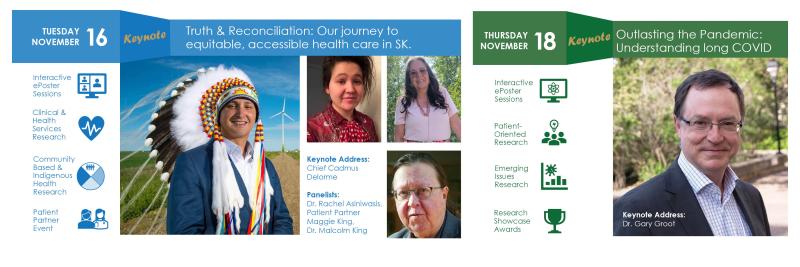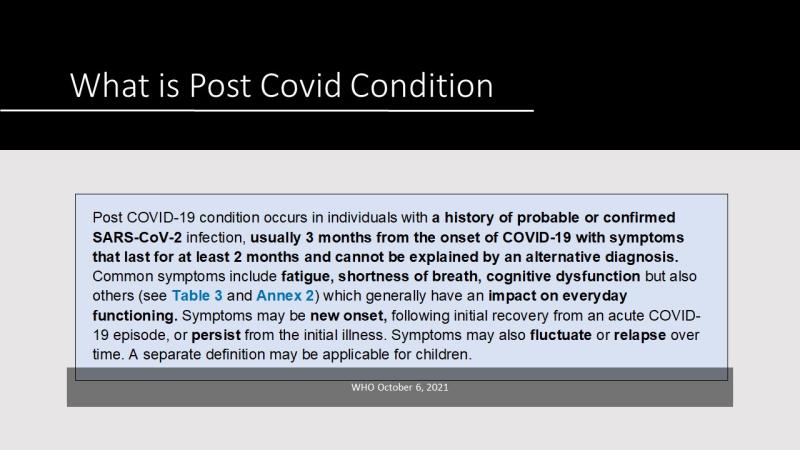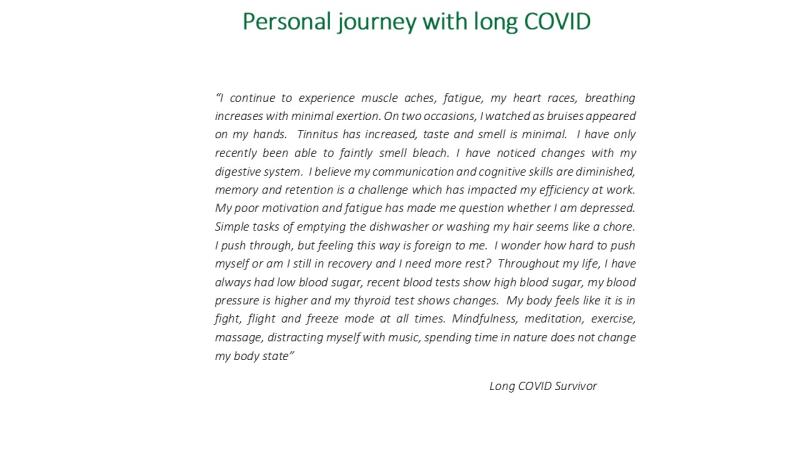Research Showcase 2021: Outlasting the Pandemic: Understanding long COVID
Post COVID Condition is the upcoming public health crisis that we will need to prepare for, urged Dr. Gary Groot at this year’s Saskatchewan Research Showcase.
Dr. Groot is a general surgical oncologist who has been building a health services program of research in the Department of Community Health and Epidemiology at the University of Saskatchewan that is aligned with his position in the SHA as the Medical Director of Clinical Quality Improvement. He was one of this year’s keynote speakers at Research Showcase, “Outlasting the Pandemic: Understanding long COVID.”
After the COVID pandemic hit, Dr. Groot says the Emergency Operations Committee (EOC) asked for support through an interdisciplinary, cross jurisdictional evidence support team. Key to this working was a unique collaboration between the College of Medicine, the Clinical Excellence Portfolio of the SHA, Librarians from the Academics and Learning Portfolio of the SHA, Researchers from Clinical Excellence, Academics and Learning and the University and the Health Quality Council. Teams of clinician experts worked with Librarians and masters/PhD trained researchers to produce rapid reviews of the grey and published literature. One of the over 100 reviews conducted was one on long COVID conducted in mid-March and updated for Research Showcase.
“The physician in me finds these words from a patient to be much more poignant,” Dr. Groot told Research Showcase participants.
We don’t yet know what causes post COVID condition.
Depending on the study, the incidence of post COVID condition ranges from 10 to 80%, which Dr. Groot says is a reflection of a lack of understanding of the disease and the different ways that the studies were conducted. As well, not everyone who had COVID had their diagnosis confirmed with a PCR test yet many of these people had problems. Likewise, many COVID patients do not require hospitalization and suffer at home.
Findings so far indicate women are more likely to suffer from post COVID condition, as well as those vulnerable populations with the least resources to manage and cope are disproportionately hit by this condition.
Dr. Groot says in order to understand the potential impact of the post COVID condition, we need to understand not only what people suffer from, but how severe those symptoms are, how long they last and what kind of treatment those people will require.
He says the vast majority of patients can be managed at home with supportive care provided by their primary care provider. A smaller number will require the support of an interdisciplinary care team (physiotherapy, occupational therapy, psychiatric care, etc), and a smaller number yet will require specialist care. Dr. Groot says most people will improve with time.
The estimations the research team had in place prior to the 4th wave of the pandemic suggested we would have up to 45,000 people needing self-management, 7,000 requiring interdisciplinary care and 5,000 needing specialist care by March of 2022.
“That was prior to the 4th wave so those numbers will undoubtedly be significantly higher than that,” noted Dr. Groot during his presentation.
Developing a pathway for patients diagnosed with the post COVID condition will be the next step, says Dr. Groot, noting that what was presented to the EOC was a “blueprint.”
A proposed a model of care for Saskatchewan is centered on primary care that utilizes pre-existing structures with the SHA. In order to do this well, primary care physicians will need to learn about the post-COVID syndrome and stay abreast of new information concerning how to best manage this complex problem, says Dr. Groot, noting material to support patients in their self-management will need to be developed and updated as new evidence emerges. This foundational work is underway even in the midst of the 4th wave.
Research Recommendations:
- Establish a provincial Registry of persons experiencing long COVID and entering the future long COVID pathway from any of several entry points.
- Establish a long COVID research group to guide the ongoing work and develop national and international collaborations.
- Conduct studies to estimate the prevalence of long COVID and understand the clinical spectrum and presentation in Saskatchewan.
- Create a mechanism to engage Long COVID survivors in all related research areas
- Consistent with a learning health approach, build in the opportunity for patient and provider involvement in ongoing program evaluation that will lead continuous improvement based on Saskatchewan specific data.
- Support and encourage researchers to engage with the long COVID research group to access data and conduct research related to clinical interventions to manage long COVID, evaluate innovative care models, support needs etc.
Dr. Groot said he has been assured this work will begin after Christmas, but exact details on what it will look like aren’t known for sure.
If you would like more information, please contact Dr. Gary Groot at gary.groot@usask.ca.





